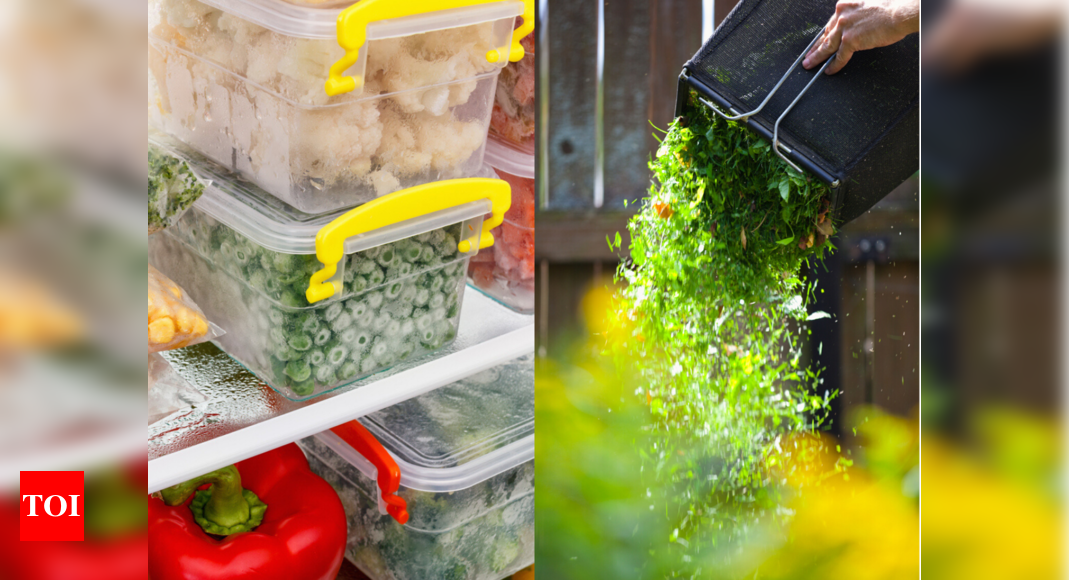
[ad_1]
“I have always thought about going zero-waste, but seeing the direct results of our actions on the outside environment during this time has made me more mindful and less wasteful. Using oil judiciously, segregating the waste and saving useful waste for future use is something we all can do, ”feels Reem Khokhar, an independent writer. Staying home and cooking more has obviously increased the amount of organic waste going into the bins. Correct utilization of leftovers and controlled generation of waste will make sure that the country has ample supply of food for the poor and needy.
Plan better, don’t hoard
The first step in moving towards a zero-waste lifestyle is to stop hoarding. Buy only what you need. “Start buying vegetables for your instant use only and not for weeks in advance. This will allow less wastage of raw produces in total, ”says Chef Dhruv Nijhawan of Prodigal Farms. Making meal plans would help in total utilization of the raw produce and even help you plan your week in a more systematic manner, thus reducing the amount of waste derived out of the kitchen. Also, buy dry products with long shelf life in bulk as that would cut down on the single use plastic packaging by a lot.
Root to shoot cooking
San Francisco based zero-waste blogger Anne Marie Bonneau says, “Rather than allowing our whims to choose what to eat for dinner, let our pantries do it. Instead of picking a new recipe to cook from scratch every night for dinner – who has time to do that? – look at what you have on hand and let that determine what you’ll cook. ” Save vegetable peels and make amazing stocks with some whole spices which can be used in cooking as a substitute to just plain water, this will reduce waste and uplift the flavor of food. “I save all my vegetable waste – peels, tops and ends, and any other bits – over 4 days at a time, storing each day’s in the freezer and adding to it until I have about 4 cups. I chuck them in with some onions, cloves, garlic, bay leaf and some other seasonings and make a rich broth out of it to flavor soups, pastas. I haven’t had to dispose off my wet waste garbage in four days because of this, ”says Khokhar.
Make a cool larder
Keep food items in cool and covered places to ensure that they are not spoiled. This could immensely reduce the amount of waste being produced at your place. Create a space for a larder or food pantry to store stuff you can’t put in the fridge. One of the biggest benefits of a home food pantry is that it enables you to prepare for short and long-term emergencies. When it comes to stocking your pantry, only buy and store foods that you already eat regularly. The perfect larder should be on the north-facing side of your property to minimize the amount of heat from the sun. Look for cupboards under stairs, at the side of kitchens, or near garages. During the lockdown period, try and have a basic idea of the expiry dates all food items in your home. It is essential to make sure that no sort of canned or packaged food is kept in your house past its expiry date.
Eat clean and healthy
Perhaps the most underestimated way to reduce food wastage is to eat healthy. Junk food, has a much faster rate of decay when compared to fresh vegetables and fruits. Buy fresh produces from local vendors and support local communities. Go for plant-based eating because as they say, “If it grows from the soil it can go back in the soil, meaning if anything is derived or grown in nature then it can converted into a compost for fertilization of your vegetables or just enriching the soil in your backyard, ”enlightens Chef Nijhawan. Buy organic vegetables only as you can use all the parts of the vegetable without fear of contamination and avoid trimmings and waste. Scrap is good for health too – eat leaves, stems, stalks and peels of veggies. Scraps are actually vitamin-packed powerhouses that can lend flavor and nutrients to food.
Freeze it
Wasting less food is about keeping ingredients fresh, being creative with what you have, and getting to know your food, especially how it ages and how it is best stored. Freezing food can reduce food waste by astonishing six times, according to a study published in the British Food Journal. Due to its longer shelf life, frozen food can result in less wastage in the delivery and storage chain. When freezing food, it should be stored properly in the freezer to stop the cold air from drying it out – a side effect often known as “freezer burn”. Also, save scraps for deliciousness. Save veggie scraps and trimmings in a bag in the freezer. They’re great for creating a lovely tasty stock.
Garbage gardening
A fun alternative to composting vegetables, garbage gardening is an easy and inexpensive way to grow flowers and edibles using kitchen scraps – the pits, seeds and roots that otherwise would be headed to a landfill. It’s a fun way to recycle. Start new plants on the windowsill by using the byproducts from roots, nuts, tubers, beans, bulbs, seeds or cuttings. Leafy vegetables that grow in heads, such as celery, romaine and bok choy, are some of the easiest scraps to grow. With vegetables such as turnips and beets, the root gets eaten and the top part, where leaves once grew, gets thrown away. These top scraps regrow tasty leaves for fresh salads or sautés.
What’s more? “Sustainable living also results in mental clarity, improving mental health. Consuming less and generating less waste gives us the opportunity to use our energies for creative activities, social work and introspection, ”says Chandra.